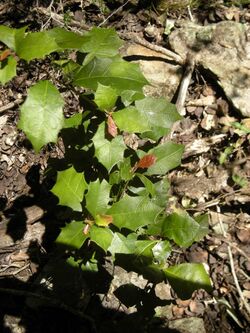Biology:Alchornea ilicifolia
| Native holly | |
|---|---|

| |
| Mount Archer National Park, Australia | |
Script error: No such module "Conservation status".
| |
| Scientific classification Error creating thumbnail: Unable to save thumbnail to destination
| |
| Kingdom: | Plantae |
| Clade: | Tracheophytes |
| Clade: | Angiosperms |
| Clade: | Eudicots |
| Clade: | Rosids |
| Order: | Malpighiales |
| Family: | Euphorbiaceae |
| Genus: | Alchornea |
| Species: | A. ilicifolia
|
| Binomial name | |
| Alchornea ilicifolia | |
| Synonyms[2] | |
|
Homotypic
Heterotypic
| |
Alchornea ilicifolia, commonly known as the native holly, is a bush of eastern Australia . It grows in or on the edges of the drier rainforests in coastal parts of New South Wales and Queensland.
Description
The native holly is a shrub or rarely a small tree up to 6 m (20 ft) tall and with a trunk that is usually crooked, with pale grey smooth bark, with some pustules and lenticels. Small branches greenish or fawn in color, with paler lenticels.[3][4] The leaves are holly-like in appearance, 2 to 8 cm (0.79 to 3.15 in) long and 2 to 5 cm (0.79 to 1.97 in) wide.[3][4][5] They are ovate or rhomboidal in shape with three or four acute lobes on each side, each of which is armed with a sharp spine.[3][4][5] They are stiff and glabrous with a petiole around 3 mm (0.12 in) long.[3][4][5]
Flowers and fruit
Greenish flowers appear in November, on racemes up to 5 cm (2.0 in) long, with male and female flowers on separate plants.[3][4][5] The fruit is a dark brown, three-lobed capsule about 6 to 8 mm (0.24 to 0.31 in) in diameter, each lobe containing one seed.[3][4][5] The plant may flower and fruit at any time of year after rain events.[4]
Taxonomy
The botanist John Smith originally described this species as Caelebogyne ilicifolia in 1839, from three specimens collected by Allan Cunningham in 1829.[6] The Swiss botanist Johann Müller gave it its current name in 1865.[1] The generic name Alchornea honours the English botanist Stanesby Alchorne,[7] while the species epithet ilicifolia refers to the holly-like leaves (Ilex).
Distribution and habitat
This species grows in vine thickets and monsoon forest on a variety of soil types, from Jamberoo on the south coast of New South Wales to Atherton in far north Queensland.[3][4][5]
Ecology
Alchornea ilicifolia is a host plant for the larvae of the common albatross butterfly and the moth Dichomeris mesoctenis.[8][9]
Gallery
References
- ↑ 1.0 1.1 "Alchornea ilicifolia". Centre for Plant Biodiversity Research, Australian Government. https://id.biodiversity.org.au/name/apni/80813.
- ↑ 2.0 2.1 "Alchornea ilicifolia (Js.Sm.) Müll.Arg.". Royal Botanic Gardens, Kew. https://powo.science.kew.org/taxon/urn:lsid:ipni.org:names:338409-1.
- ↑ 3.0 3.1 3.2 3.3 3.4 3.5 3.6 "PlantNET - FloraOnline". Royal Botanic Gardens and Domain Trust, Sydney. https://plantnet.rbgsyd.nsw.gov.au/cgi-bin/NSWfl.pl?page=nswfl&lvl=sp&name=Alchornea~ilicifolia.
- ↑ 4.0 4.1 4.2 4.3 4.4 4.5 4.6 4.7 Forster, Paul I. (2022). "Alchornea ilicifolia". Australian Biological Resources Study, Department of Climate Change, the Environment and Water: Canberra. https://profiles.ala.org.au/opus/foa/profile/Alchornea%20ilicifolia.
- ↑ 5.0 5.1 5.2 5.3 5.4 5.5 "Alchornea ilicifolia". Centre for Australian National Biodiversity Research (CANBR), Australian Government. 2020. https://apps.lucidcentral.org/rainforest/text/entities/Alchornea_ilicifolia.htm.
- ↑ Smith, John (1839). "Notice of a Plant which produces perfect Seeds without any apparent Action of Pollen". Transactions of the Linnean Society of London 18 (4): 509. doi:10.1111/j.1095-8339.1838.tb00200.x. https://www.biodiversitylibrary.org/page/5436888. Retrieved 31 March 2023.
- ↑ Cooper, Wendy; Cooper, William T. (June 2004). Fruits of the Australian Tropical Rainforest. Clifton Hill, Victoria, Australia: Nokomis Editions. p. 171. ISBN 9780958174213. https://www.nokomis.com.au/product/nokomis-published-books/fruits-australian-tropical-rainforest/.
- ↑ "Alchornea ilicifolia (EUPHORBIACEAE); Native holly". http://www.brisrain.webcentral.com.au/01_cms/details_pop.asp?ID=18.
- ↑ Robinson, Gaden S.; Ackery, Phillip R.; Kitching, Ian; Beccaloni, George W.; Hernández, Luis M. (2023). "HOSTS". Natural History Museum. https://data.nhm.ac.uk/dataset/hosts/resource/877f387a-36a3-486c-a0c1-b8d5fb69f85a?view_id=e2a17eb7-1c7c-4d41-9d95-7c697f5d50ab&q=Alchornea+ilicifolia.
<ref> tag with name "DESQLD" defined in <references> is not used in prior text.External links
- View a map of historical sightings of this species at the Australasian Virtual Herbarium
- View observations of this species on iNaturalist
- View images of this species on Flickriver
Wikidata ☰ Q4713056 entry
 |





